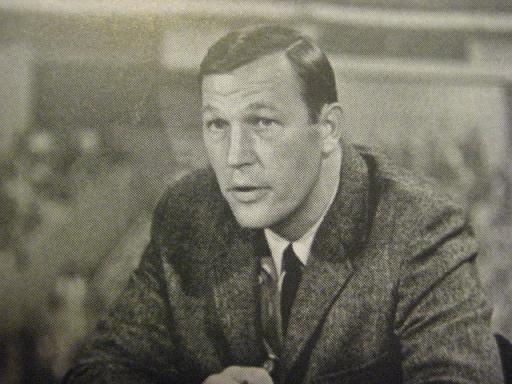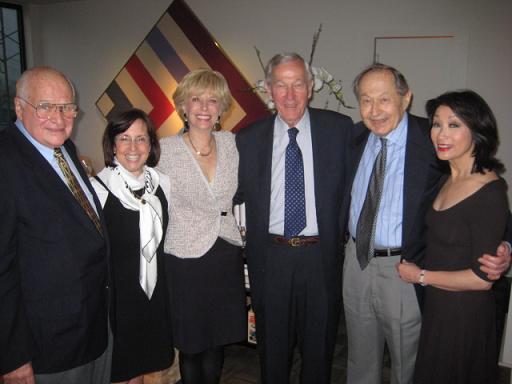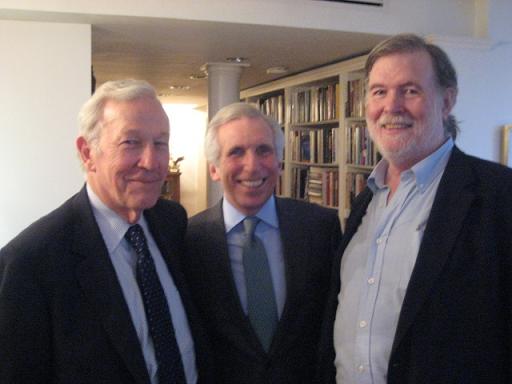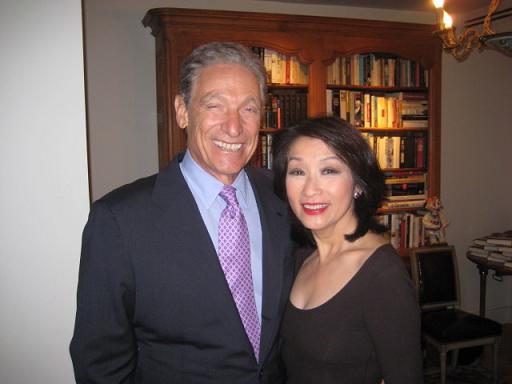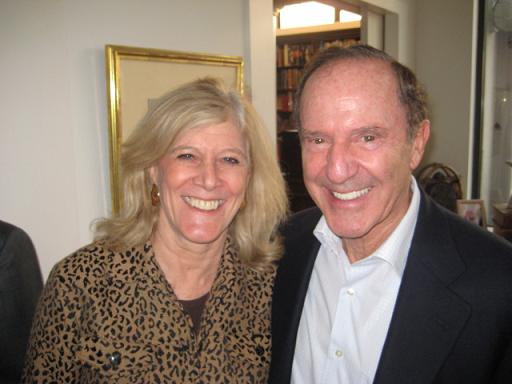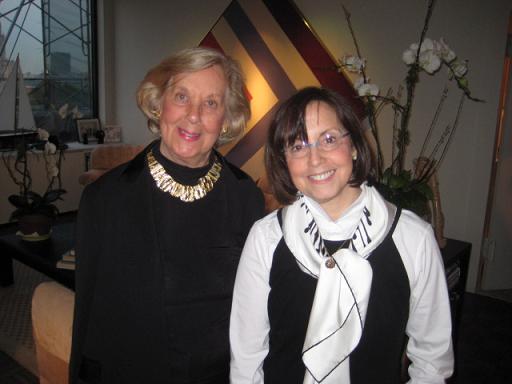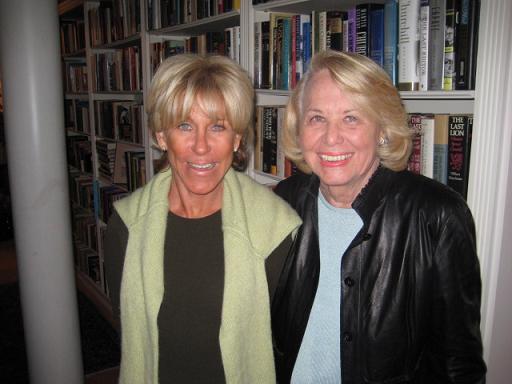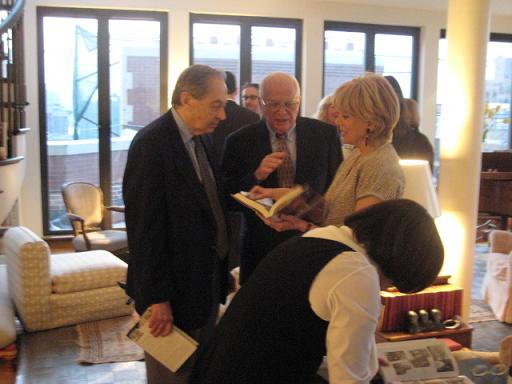
Roger Mudd was before my time, but he might not have been but for one decision made 28 years ago: Who would succeed Walter Cronkite in the CBS anchor chair. Mudd had been Cronkite's stand-in and weekend newscast anchor, and was widely favored to get the job. But there was also this wild card named Dan Rather, and, well, we all know how that went down. Mudd had spent almost 20 years at CBS, and he refused to take it; CBS had added insult to injury and had kept him hanging even as tongues were wagging all over town and items began appearing in gossip columns. The day he found out he walked to his desk, packed it up, and left, going to join NBC News, where he co-anchored NBC Nightly News and co-hosted Meet The Press. He spent five years at NBC before leaving (also unhappily), first to the MacNeil-Lehrer Newshour, then to the History Channel. He's had a great career — turning of course, on the fulcrum of that one decision — but either way, Mudd will tell you that it doesn't matter: He's a CBS man through and through. That's a quote from Mudd's new book, The Place To Be: Washington, CBS, and the Glory of Television News. In it, it becomes clear that Mudd 's time at CBS was defined not by the reason he left but by all the reasons he stayed, for the 20 years before.
The key experience within that was Mudd's experience in the network's D.C. newsroom, working with such young up-and-comers as Bob Schieffer, Bill Plante, Lesley Stahl, Connie Chung, Ed Bradley and Susan Zirinsky and, of course, Rather (not to mention outsiders like White House Press Secretary Bill Moyers!). Mudd's stories are stories of the news of that time, as seen through his memories of that gang of them working to pull it together. Sometimes, it would make the news itself, like when Mudd asked presidential aspirant Ted Kennedy why he wanted to be president and the young Senator had no answer — a moment that was credited as being the beginning of the end of his candidacy. If you like news and are interested in the industry or history or both, it's s fascinating read, and a great look into the differences - and similarities - in how the news gets made.
I'm one of those people who like the news and am fascinated by this type of story (for obvious reasons), and what is such a great part of it is having it told by someone with the experience and breadth of Mudd. Now 80 and sharp as a tack, he's brought his decades-long experience to bear on telling this story and framing the time — various players can haggle over whether he's fair or bitter or what, but for the most part the newsroom drama seems pretty familiar: Egos, adrenaline, and the twists and turns of the news. (For a quick primer, and some perspective, see the NYT on Mudd here, from 1987.) I had an opportunity to sit down with Mudd at talk to him about the book, the news, the industry and how he sees it all, and it was fascinating - so fascinating that I had a really hard time editing it down, so I mostly didn't. Mudd's great and insightful comments are below in a very lightly edited transcript of our chat - for those readers who would love to drop in on a conversation with a guy like this, well, here's your chance. On the 100th anniversary of Edward R. Murrow's birth, it seems the least we can do.
Sprinkled throughout are photos I took of Mudd and his former crew at his New York book party earlier this week, hosted by Lesley Stahl at her apartment and attended by some of the old faces including Chung, Zirinsky, Sandford Socolow, and Bill Small, plus others. I hope you enjoy reading it as much as I enjoyed talking with him.
*************
So! Why this book?
I had retired after 50 years in 2004 and people, friends, had urged me to write something. I started off without any plan. I just started writing about when I was in the fourth grade - when I was in the army - and it didn't have any cohesion to it, so a friend arranged to have Peter Osnos, the Public Affairs publisher, to take a look at it. I sent him fifty pages of stuff I had written — a chapter about being at CBS and a chapter about being at NBC. He read it and said he didn't want to publish it — that everybody knew what had happened to the networks and how the quality had declined and a little bitterness comes through, and you don't want to have that as a quality of your writing, so why don't you write about the time when being a professional journalist - television journalist, was a happy time and people were proud of what they did? Why don't you write about that great bureau that you were a part of back in the 60s and 70s? And I said, "God Almighty! Great idea."
So the next morning I did 180 degree turn and began to lay it out, bought a little micro-cassette recorder and began to track down all the men and women who had been in the bureau during those twenty years. They were all just delighted to talk about it because they were all so proud of it and still are. So it was just a confluence of my retirement and the time to do it and a marvelous idea from a publisher, but not triggered by anything that's going on now, although in the context, it seems to be appropriate both, period.
Because of Dan Rather?
Yeah, correct.
Were you surprised at how that ended up?
Yeah. Well, it - I'm not sure surprised is quite the word, it was painful for me because I had gone through not quite what he went through, but I went through a publicly discussed demotion, which is always difficult for people with egos. And we all have them...
Or, people who have served for many years...?
Yeah: to be told that you're not the first choice, that's always hard. So, anyway, his fall was different than mine - he had been the number one man there for a quarter of a century, I guess, and I had been a substitute, on and off. But anyway, I thought it was difficult for him - painful for everyone to watch and I think that he had done more than any of his competitors — he had answered the call more quickly and gone anyplace they asked him to go. I thought he was a very hardworking man who was, in fact, tightly wound and a complicated fellow, and I thought what came across was someone not quite comfortable with himself and I think that came through.
So, it definitely sounds like you've been keeping up and making sure that you are watching. So...you've been watching CBS?
Oh, yeah. I usually - just as an old horse in the stable, I turn it on just because that's my company and always feel it will be and I still know some people there. So I usually start with CBS at 6:30pm and will stay with them until 7pm, and then generally go over to Jim Lehrer where I also had worked for five, six years and know those people. I bounce a little bit, but not much.
Do you find yourself watching "Meet The Press"?
I'm not a regular viewer. When I see something I want to watch, I'll view it. But Sunday morning, in this house, usually we read the papers. If it's something really interesting I'll turn it on and watch every other Sunday, every third Sunday but more during the political season than not.
What was your perception of Katie Couric before she came to CBS, and how did you perceive her when she was actually in the chair?
Well, I think CBS really — the management — really didn't judge the reaction to her. I don't think they were prepared for the negative reaction. They put in a new producing staff and produced in the beginning, really, I thought, an inferior program and so, saddled her with it, and people took it out on her as they would take it out on any anchor for an inferior program because it was kind of a mish-mash in the beginning. And so, beyond that, what Katie brought with her was the reputation that she had made - and a substantial one - from the "Today Show" as a lively, happy, very good interviewer who knew her way around, but not as a solid hard news person, which you really can't be on a morning program - you have to be so versatile and have a easy acquaintance with so many different things. So then they bring her over into quite a different assignment and I think, for all those people who had watched her so long, the change of her assignment and the different culture was a shock to everyone.
I want to ask you about the dual nature of these networks - as families on one hand, and businesses on the other. People really grow close to their colleagues, but then, well, it's a business. I think this came into sharp relief with the lawsuit, where part of it was that it wasn't that Dan had to step down from the chair so much as, what happened to him after - the fact that he had been marginalized so — you do get a sense that it is a sad thing to have to leave a place that you spent so many years feeling so good about, under such a cloud.
That's something that I took from the chapter when you detail how terribly they handled letting you know how you didn't get the job, how everyone else knew and you knew they all knew, but CBS didn't even tell you until the very end — I just was curious as to your thoughts on corporate loyalty in this business?
After that happened all I wanted to do was get out of there because I had thought I had not been treated fairly. The decision was - I understood they've got the perfect right to make their decisions, I just think that television communicators are not really good communicators: they don't write memos - they talk - and everything is very imprecise and I think they are afraid to put down words because they are afraid it'll come back to get them, so there's an awful lot of talking going on. So they're not able to communicate very well, they don't have a sense of what it is when you are on the tube four or five nights a week, what it does to your psyche when you are jerked up short and made, in effect, to walk the plank. Then they have to justify the decision and that involves denigrating you and saying your weren't well-rounded or you hadn't done this and you were hung up on Washington D.C. and you didn't like foreign news - all the things that they said off the record in order to justify their decision to pick Dan. But that case, that treatment was not peculiar to me. It happens a lot and as you say, as you suggested, it is a business first and foremost and it's gotten more so because of the intense competition — back in the 60s and 70s with just three, four networks an audience had no where else to go ...the competition was ongoing but not anywhere near what it is like now. You know, it used to be that the pie was sliced up about five or six piece and now, you know, it's 500 pieces of the pie and everybody's gotta keep their little slice and make it sweeter and sweeter and hold the audience they have.
Well, there has to be news in there somewhere.
I think generally speaking the commercial networks have sort of left the field of political reporting, you know, the night of the Ohio/Texas primaries - ABC had, they ran - what was the show? "The Last Laugh" and CBS ran "Big Brother" and NBC ran "The Biggest Loser" - there wasn't a bit of political news: they yielded the field to cable. So...I found the audience was a very small audience for politics and if you are a journalist that's putting a pretty heavy weight on your chest to carry around, particularly, if some of the men and women who are still there are honest, hardworking journalists who can't get on the air.
In the times when you were at CBS or even NBC, how would a big primary have been handled?
Well, you'd do the evening news from 6:30-7pm and then you'd do your updates for the West Coast and then at 8pm, you'd come on and you'd stay on 'til 11pm and then you'd break for the local news cut-away and then you'd come back at 11:30pm. I remember we were on the air in '62 until 2am, until Richard Nixon conceded that he had lost the governorship in California. To be on primary night, or election night was a major, major assignment and most of us were out on the road, traveling with candidates and we'd come in a week before election night and we were detached from our other duties just to get ready. It was - that was the feather in your cap to be picked- I was always on the south desk and Mike was the east desk and Dan was in the Middle West or Harry - ? on the West Coast and that was an honor to be picked and you worked hard and you were dealing in hard news information and what you'd gather as a reporter on the road. But now, you know just the evening news now - the competition is such now with cable and all the outlets Fox and CNN and all that so by the time people get home at 6:30, you kind of know what's happened so the three big network newscasts at 6:30 or 7, they give you basically the first ten minutes of news and the rest of the program is pretty much features. Thirty, forty years ago it was four sections of hard news and one section of feature, and the feature would be a Sevareid analysis or an on-the road piece.
Diagram of the CBS Washington bureau in 1969, drawn by Bob Schieffer (from "The Place To Be")
Have you settled into having a go-to cable network for the news?
Well, during this last season we had not been much cable watchers until this interesting campaign that's going on now. I tend to like MSNBC a little better.
Why is that?
Olbermann is outrageously good. He's funny and I'm learning stuff on there that I'm not hearing. A lot of that political patois that I pick up from him and Matthews, and that seems to be an added contribution. I don't watch FOX. I've tried it several times and CNN is okay, but I think they have too many people and too many graphics. It's not a serene network.
I'm curious how you feel about inserting opinion into the coverage? Olbermann is clearly—
Opinionated. Yeah, after awhile you sit and laugh at it and cable has this special ease to say those things since they are cable and not really regulated, are they - by the FCC?
They seem to say whatever they want!
Yeah, yeah. So, you - if you tend to be a centrist or a little left of center you watch him and if you tend to be a little right of center, I guess you watch FOX. CNN I think right now is probably the middle. They have a three-deep bench over there of talking heads so you can pick what you want to listen to. I don't know whether you remember Jack Chancellor, but he always hated us to make any prediction at all at NBC. He always thought that we should say, "and tomorrow the candidate flies to Cleveland. Roger Mudd, NBC News, Cleveland." Or whatever. He just didn't get into the business of predicting!
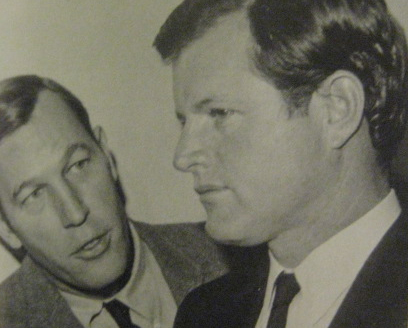 Were you surprised when you, historically, suddenly popped up in the campaign in that famous Kennedy moment?
Were you surprised when you, historically, suddenly popped up in the campaign in that famous Kennedy moment?
Well, everybody remembers it. I'm not - I guess, I've seen it referred to here and there I don't think it ever got to be any factor in this campaign. It was, that Sunday night was awful lot of people saw it. Not as many as saw "Jaws," - which was up against it, I think - but I remember Bob Dole's quote "70% of the people watched Jaws, and 20% of the people watched Roger Mudd and half of them didn't know the difference" was Bob Dole's quote.
Wow.
Yeah - ouch!
It couldn't have been an easier question to answer if you actually knew why you wanted to be president.
That's right. It's an interesting question that not many reporters ask because it's such a flat-footed question and sounds like a question that anybody would knock out of the park, but the interview was - I just wasn't getting anywhere with his answer on how he would do things differently than Jimmy Carter, and it occurred to me, if it wasn't a great deal of difference between his policy and Carter's policy than why would you want to be President? Why would you want to replace someone from your own party that was up for re-election and with whom you didn't have a great deal of difference - so, that was why I asked the question. And it was obvious, when he answered it, that he never really thought about it!
I think that's the sort of thing you don't get these days because everybody is so scripted.
Yeah.
That definitely came up around the time of Kennedy's endorsement of Obama. People working backwards to when Kennedy was running because that was the only other time that Caroline Kennedy had endorsed.
That's right, that's right.
Do you run into him in Washington Circles?
Not so much. No. It's been awhile. The last time I saw him was at a Mass in Georgetown and I described in a chapter, I was going up for Communion and I felt a little tap on my shoulder, looked up and it was Senator tapping me - not a political slap, just a nice little touch - and I thought it was nice of him to do that because it must have been difficult for him to see his campaign blow up in his face. I don't think the interview - it didn't help - but I don't think it was responsible for the collapse. I just don't think he was ready to run and hadn't really thought about it. But I don't see him very much, no. But when I do, it's very much - you know - it's okay. Friendly enough. Like any reporter's relationship with a Senator.
Some are closer than others.
That's right. I guess.
Before this election - one thing I find interesting with the proliferation of cable, they're looking for everybody to opine. But you haven't really taken to the airwaves as a pundit.
No.
Why? Is that something you consciously decided not to do, or something you think you would like to do? Something you ever thought of?
Well, I - no. I'm not trained to do that. I never felt quite sure - one thing I don't like - to be wrong. And I'm a perfectionist in that I never felt the desire to be a pundit. On election night, you would naturally discuss why someone had lost/someone had won, but always based on your own observations - it was reportorial rather than editorial. Toward the end of my time at CBS, I was doing - not editorial pieces but pieces that had a sharper little edge to them rather than just a daily account to things going on, on the Hill. But I never felt comfortable moving into the world and I was never asked to and I am - because I think most people knew what my strengths were, and I wouldn't be very good as a pundit anyway.
Oh, I don't know — I think it's interesting when somebody with a certain level of experience puts things into context and draws parallels. That's one of the things that I watch for - what I watch and what I enjoy hearing from people and one of the reasons that I'm so interested in your "take" on the current news situation. So you said you get most of your news from newspapers?
Yes.
Old-school newsprint?
Yes: Washington Post, New York Times, Wall Street Journal. And I'm on the computer enough to know - to follow some online stuff but mostly it's newspapers.
What about online - HuffPo, Drudge, Talking Points Memo - aggregators with opinion...?
Yeah, I must say I'm not an aficionado of them. I haven't become one because - the main reason is because I've been so busy until this last month or two finishing up this book but I must say, I am not as cyber-skilled and don't feel as comfortable going from one site to another as my sons do or some of my reportorial friends. So I'm not a constant visitor to the sites, which you mentioned.
What about things like YouTube - things that are changing literally the way people are viewing political moments - delivering clips to inboxes as opposed to having to wait until 6:30pm?
I remember what a sea change it was when newspapermen and women began to carry tape-recorders. That was - only for awhile, it was only the television networks with the bull-mikes or you could talk a Senator into wearing a wireless mice while he was campaigning in a crowd you would be with a crew following him but then came these lightweight recorders and then the wire services and newspaper men with their little mice and from that point on, there wasn't anything, anything - anybody could do in private. And then came the digital cameras and all the Blackberries and everything - there are no private moments anymore.
Roger Mudd, back in the day (from "The Place To Be")
The tools are different now.
Oh my God — iPod, iPhones, texting - everything! I think a well-equipped reporter has to have a saddlebag to put his stuff in!
I wanted to get back to the book, and the people in it. I am struck by how so much this is a business of relationships. It's about people who have years of having worked with the same people, same network and it's a very personal thing. That's clearly your take on it, and I was just wondering how it felt to put it all down and how it felt for the people you spoke with?
Well, it was like a class reunion. It was, I was alone doing it but it was not lonely doing it all -the interviewing and the gathering of stuff and tracking people down was an awful lot of fun and really pleasurable, reliving a marvelous period of your life, when you - when we were all at top speed and felt we could conquer the world. But when I'd call the people - from Connie Chung and Lesley and Barry Serafin and Jed Duvall- they were just delighted to talk, which helped me immensely because they were as proud of their time in the bureau back then as I was, and nobody had ever written about it, really. Not a book about it. There had been mentions - you know, Schieffer mentioned it and Lesley mentioned it - you know, just being in the bureau, but there wasn't - nobody had ever done a breakdown of how the bureau worked: character sketches of Mr. Small and Bill Galbraith who ran the desk, and the camera crews and the projection room and the couriers - so they made it a very happy experience. Everybody I talked to was such a marvelous storyteller themselves and had - was just loaded with information that they carried with them and hadn't had a chance to pass on to anybody that an awful lot of the stuff, as they say, just wrote itself. Stories and things that they had remember and I hadn't. Stories were you get to laughing on the telephone and you'd have to stop and call him back because I'd be laughing so hard I couldn't keep up the interview.
Sounds like an amazing experience. So, whom would you have counted some of these people as your friends? Had you kept in touch with them over the years?
Well, Bob Schieffer is one. Of course, he's here in town.
Do you go see his band play?
I've heard about it and we've talked about it but I know he was up in New York playing but I have not seen it yet....Susan Zirinsky and Bill Galbraith, Barry Serafin in Oregon and David Schumacher is nearby. Brian Healy - Brian was one of my producers and we stayed in touch...Fred Graham, and a few others are all here in town and I see them from time to time so, it's - and Marvin Kalb, Bernie Kalb's brother - they are all here. But - and Bill Plante. Schieffer and Plante - Bill Plante and Bob Schieffer are the only two left standing, in the bureau from the old days.
Is it true that Susan Zirinsky was the model for Holly Hunter in "Broadcast News"?
No, she was - she was a consultant on the movie and I don't know whether you remember - what was the name of the newscaster in that movie?
William Hurt's character?
Yeah. He always shook hands in a certain way - with his right hand he would touch your right hand and with his left hand he would touch your right elbow and that's EXACTLY the way Dan Rather shakes hands.
Really?
She passed that on to the producer/director of the film and he worked that in every time he shakes hands, you can see that.
Have you been in touch with him over the years?
Well, after he was unhorsed (it's it in the book, I don't know what the page is), a reporter from the Washington Times called and said, "can we have lunch?" He said, "I used to watch you and I lost track of you." So, you know, we had lunch and inevitably the question came up about Dan Rather and I said - I told him, what I told you earlier - that I thought he had answered the bell more quickly and had gone more places and had done more things - had been more selfless than - he was everywhere - and I thought he should get credit for that. Well, somebody sent him a clipping and about a month later, I got a really nice hand-written note from him and it was touching, and so one thing led to another and the correspondence didn't blossom but at least the ice had been broken. So when the time came to write the book, I sent him a letter and told him what I was doing and told him the book would not be complete unless I got to talk to him and so, we worked out a time and we were both in New York for Gordon Manning's funeral - which had been 2006 - and he had come by the hotel and I had my little micro-film cassette and we sat down and we had an hour and a half of talking - not easy to do - but I'm glad we did it and I could tell he still harbored some resentments the way I treated him and vice-versa but anyway, we talked about it and gotten it out and so I've seen him a couple times since.
That's amazing so many decades later to sit down and have a frank discussion like that.
When I was at NBC Connie Chung and I had a difficult relationship and to do the book, I got in touch with her and she was just delighted to talk again, so we've resumed a modest exchange of emails and she sent me photographs. After awhile, you just don't want to keep going with grudges. It's cleansing to do that.
Bill Small, Susan Zirinsky, Lesley Stahl, Roger Mudd, Sanford Socolow and Connie Chung at the book party for Mudd, hosted by Lesley Stahl (photo by Rachel Sklar)
I guess along those lines - when you are in the moment, things feel so important and personal in the workplace sometimes and after having the luxury of decades of reflection, you look back at it - are there are things that you did or positions that you took - or ways you think when you look back, "oh, it wasn't such a big deal," - and let it go?
I think I should have been a lot softer - on the edges. I wouldn't - I don't think looking back I could have or should have been any more demanding than I was but I think I could have done it in a way that was a little easier on people because I admit I was not easy to work with and I should have been because in the end, it's to everybody's advantage when you feel good about what you've done, and not feel scared about having done it. And I think some of the younger people I talk to on the phone who were in the bureau just starting when I was, you know, top four-five in the bureau, they said: "I was terrified when you called me because I knew I would say something wrong and you'd nail me." And I mean, they laugh about it now but looking back - that shouldn't have been that way.
Well - it does force people to learn!
Oh sure, but there are sweeter and softer ways to do it and still make your point without sending a young woman off to the ladies' room to cry!
I imagine at that time too, it was not an easy place to be a woman.
Back then, we had Connie and Lesley Stahl and Marya McLaughlin, and Susan was on the desk and Louise Remmy and we got Hal Walker was our first black person CBS network reporter and Bernie Shaw — and you know, during the first decade of Dan Rather - I used to watch his news regularly back then - and more than half of his correspondents back then were women. There was just a huge movement after - toward the end of the Seventies and in the Eighties. And talk about "Meet The Press," I saw [recently] Russert had two really, really sharp women from CNBC.
Erin Burnett and Maria Batiromo.
They just ran rings around everybody! They talked about the economy and the mortgage blowup and the subprimes -
I agree. I thought it was fascinating and they were both great. Did you see Lynn Sherr's book, "Outside The Box?" It dealt with the whole issue of women struggling to make it in TV.
No, I didn't. I know her, but I did not see it. Oh - someone I really like at ABC is Martha Raddatz. I mean, aside from the interview with Cheney - Martha takes aim and hits her target every time. She is really, really good — they had a book party for the Peter Jennings book in Washington and I met her for the first time and I said, "Well, there's no BS with you, Martha!" And there isn't. She really knows her stuff.
Is there anybody else who has caught your eye as really impressive?
Yeah, what's his name at NBC? The white-haired guy?
David Gregory?
Yeah, yeah! I think he is very good and judicious, and I like David Martin over at CBS at the Pentagon. I think he's being used less and less because I don't see him much anymore. It's good to have Jeff Greenfield back on CBS. He's always knows what he is doing. I don't know the others well enough - I'm not used to them enough because - there was a time at CBS where they didn't have anybody at all on Capitol Hill. They had NO reporter on Capital Hill and then they got Gloria Borger and now she is gone and now they have - I don't have a lock on the names - but the Washington bureau has got about eight or nine reporters.
Chip Reid?
Yeah, they hired him away from NBC but he's been out in the field. And they got Frank Reynolds boy, they hired him away from ABC, I guess - what's his name? Dean Reynolds. He's very good. Easy to listen to and knows his stuff.
And Jake Tapper...
Jake Tapper, Jake Tapper...I know the name...I don't have a lock on him.
He's at ABC, doing a lot of election stuff. Okay, so my last question —
[Laughs] Okay!
I'm sorry, I'm just finding all this really interesting. You should reconsider going on cable!
[Laughs again]
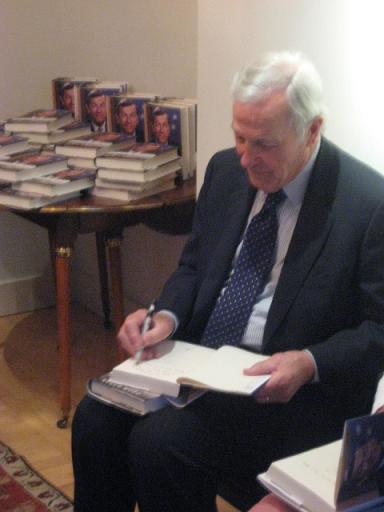
No, I've come to terms with it, I came to terms with it long ago, long ago. And what's interesting is that so many people - fewer, as the months and years go on, but still people come up to me and say, "You were great. We really miss you. We really miss you. And you should have had the job." And you don't have to ask them what job they are talking about; they mean just to succeed Cronkite. And that's fine. But I think, really, as sharp as the disappointment was back in '79, that I don't think I would have been happy. I can say that now because I know enough about what anchoring would have been like and what my life would have been like and what really made it difficult for me as a substitute anchor when I would come up during the summers and do Walter's show, is that I couldn't vouch for everything I was saying. That always bothered me that something would slip through and I would get stuck with it and I would be the one who was wrong and they say to be wrong and in addition to those other things we talked about, how that anchor he is - what did we say - 37% journalist and 63% showman? Does that add up to 100%?
[Laughter]
Whatever the math should be! So that, after - to try to answer your question - I've come to terms with it. I have led a happy life. People still say they miss me and that's fine but I'm not sure I miss it anymore and I haven't for a long time, simply because your life changes and you are priorities change and your outlook changes and things that you thought that you could not live without, you find that you can live without. And I went on to have a few pretty good years at NBC and then I was at the History Channel or ten years doing some interesting work, but, I think - you know, my health is excellent and all of that I'm very thankful for. But for the time I was at CBS, I still say - I'm a CBS man, no matter how many times you heard me say, "Roger Mudd, NBC News." It still is the central experience of my life. May I amend that: the central professional experience of my life. I have a marvelous family and they are all fine. I have four kids, I've got three men and a woman, and eleven grandchildren and everybody is healthy and so, for that I'm thankful.
*******
Roger Mudd, Public Affairs publisher Peter Osnos and Stahl's husband, author Aaron Latham
Connie Chung and husband Maury Povich
Mort Zuckerman and ABC's Lynn Sherr, author of Outside The Box as mentioned above.
The long-suffering E.J. Mudd and Susan Zirinsky - E.J. patiently waited while Roger tackled the book - including transcribing all his interviews himself. Which one is the bigger trooper for that, I wonder?*
Liz Smith and Joni Evans of WoWoWoW
The old gang remembers their time at...

*Thank Alana Samson for the great transcribing help! Photo of Mudd and Ted Kennedy from "The Place To Be"; all other uncredited photos by Rachel Sklar.

